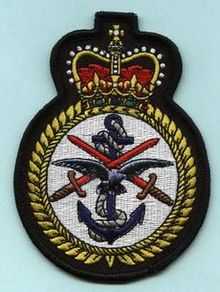Defence College of Policing and Guarding

The Defence College of Policing and Guarding is the training centre for the Service Police of the British Armed Forces. The centre is located at Southwick Park, near Portsmouth, Hampshire, it was established on the former site of HMS Dryad and consolidates training for the Royal Military Police, Royal Air Force Police, and Royal Navy Police in a single location assuring consistent standards across the service.
History
HMS Dryad was the Royal Navy's school of maritime warfare until its closure in 2004. The Defence College of Police and Personnel Administration was opened in 2005 consisting of the three service policing schools. The regimental headquarters of the Royal Military Police also moved to the site following withdrawal from Roussillon Barracks, Chichester. RAF Police training moved from RAF Halton in 2005. Royal Navy Police training moved from HMS Excellent.
Police training for Royal Marines Police was formerly conducted at Rousillon Barracks and HMS Excellent, prior to their integration into the Royal Navy Police.
Professional training and qualifications
Training is accredited by the University of Teesside and is validated by the National Policing Improvement Agency who assure standards on behalf of the Home Office.
The college offers both initial trade training for members of the three service police branches and the Military Provost Guard Service. Promotion courses are delivered to allow individuals to qualify for progression to higher ranks and specialist courses afford individuals the skills necessary to focus on a particular area of policing.
Military police training
Co-location allows the services to exploit opportunities for common training in policing practice and the application of both civil and military law, with all three service discipline systems being underpinned by the Armed Forces Act. Trainees are taught how to apply these principles within their jurisdiction in the UK and overseas in fixed military establishments and on operations. Common elements of military application are complemented by single service elements, allowing the individual to develop within their own service. examples of these include the use of personal weapons and military driving, handling of foreign nationals and lines of communication policing, as well as the protection of logistic routes.
Courses for officer candidates cover both policing and the management of policing within their service and joint environments. Service policemen return to the college for promotion courses required by their respective services and for specialisation training, allowing a focus on a particular aspect of investigation.
Royal Military Police
Soldiers entering the Royal Military Police are posted to the college having completed Phase 1 training at the Army Training Centre Pirbright. Successful completion results in promotion to lance corporal and posting to an operational unit as a probationer. Officers for the Royal Military Police undertake training on completion of commissioning courses at Royal Military Academy Sandhurst.
Royal Air Force Police
Airmen are posted to the college having completed Phase 1 training at RAF Halton. Successful completion results in the individual being promoted to corporal and being posted to an operational unit. Officers of the Royal Air Force Police undertake training on completion of commissioning at Royal Air Force College Cranwell.
Royal Navy Police
Royal Navy and Royal Marines candidates are not recruited directly but are transferred from other branches where they have qualified for promotion to corporal or leading hand before being posted to the college; having completed a 4 week suitability assessment. On completion of training they will be promoted to the rank and posted to an operational unit. Officers for the Royal Navy Police are drawn from the rating corps as senior upper yardmen and are commissioned following training at Britannia Royal Naval College or Commando Training Centre Royal Marines.
See also
| ||||||||||||||||||||||||||||||||||||||||||||
| ||||||||||||||||||||||||||||||||||||||||